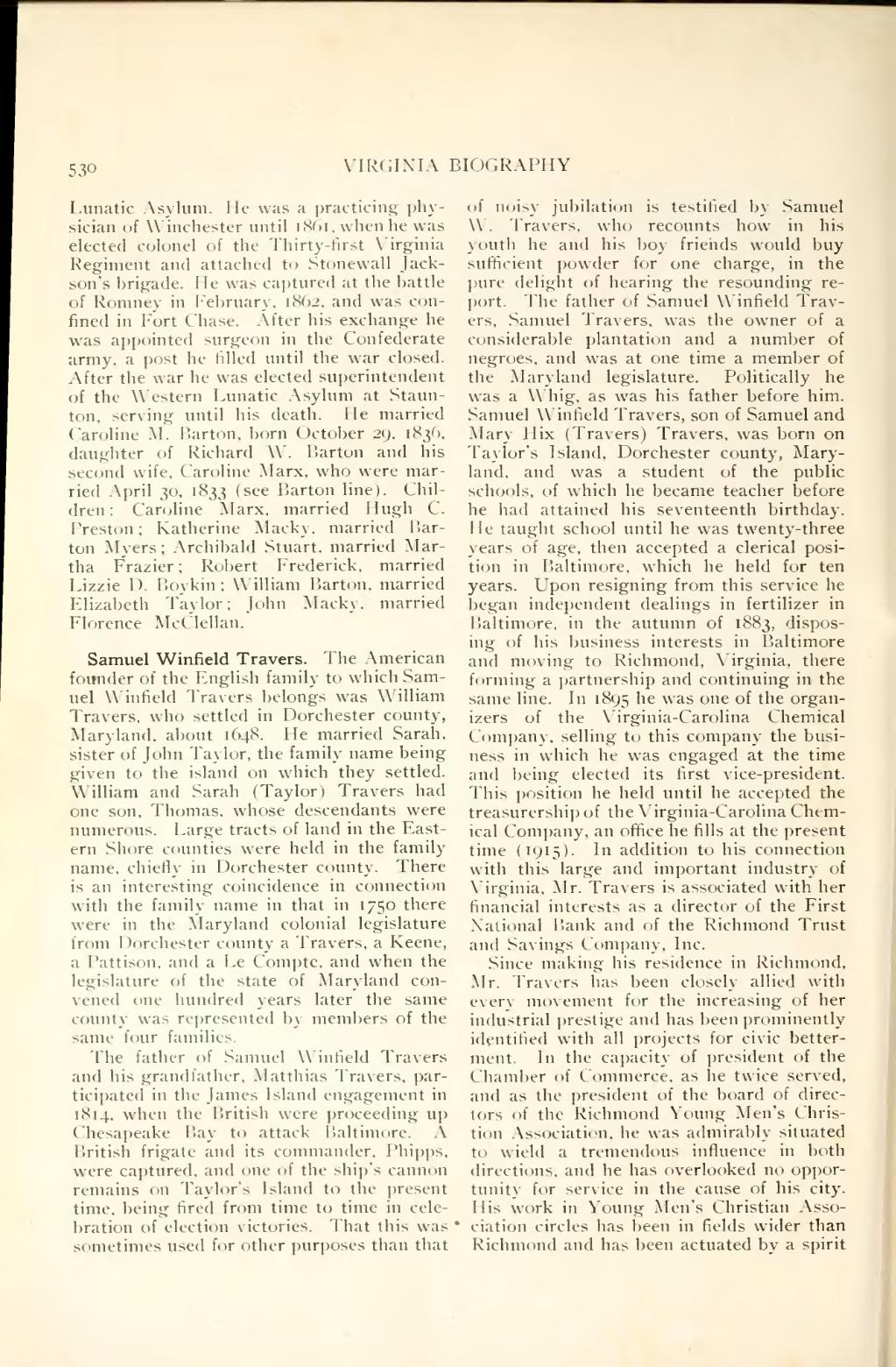530
VIRGINIA BIOGRAPHY
Lunatic Asylum. He was a practicing phy-
sician of Winchester until i86i.\vhenhe was
elected colonel of the Thirty-first Virginia
Regiment and attached to Stonewall Jack-
son's brigade. He was captured at the battle
of Romney in February. 1862, and was con-
fined in Fort Chase. After his exchange he
was appointed surgeon in the Confederate
army, a post he filled until the war closed.
After the war he was elected superintendent
of the Western Lunatic Asylum at Staun-
ton, serving until his death. He married
Caroline M. Barton, born October 29, 1836,
daughter of Richard W. Barton and his
second wife, Caroline Marx, who were mar-
ried April 30, 1833 (see Barton line). Chil-
dren : Caroline Marx, married Hugh C.
Preston ; Katherine Macky, married Bar-
ton Myers ; Archibald Stuart, married Mar-
tha Frazier ; Robert Frederick, married
Lizzie D. Boykin ; William Barton, married
Elizabeth Taylor; John Macky. married
Florence McClellan.
Samuel Winfield Travers. The American founder of the English family to which Sam- uel Winfield Travers belongs was William Travers, who settled in Dorchester county, Maryland, about 1648. He married Sarah, sister of John Taylor, the family name being given to the island on which they settled. William and Sarah (Taylor) Travers had one son, Thomas, whose descendants were numerous. Large tracts of land in the East- ern Shore counties were held in the family name, chiefly in Dorchester county. There is an interesting coincidence in connection with the family name in that in 1750 there were in the Maryland colonial legislature from Dorchester county a Travers, a Keene, a Pattison, and a Le Compte, and when the legislature of the state of Maryland con- vened one hundred years later the same county was represented by members of the same four families.
The father of Samuel W'infield Travers and his grandfather, Matthias Travers, par- ticipated in the James Island engagement in 1814, when the British were proceeding up Chesapeake Bay to attack t'.altimore. A British frigate and its commander, Phipps, were captured, and one of the ship's cannon remains on Taylor's Island to the present time, being fired from time to time in cele- bration of election victories. That this was sometimes used for other purposes than that
of noisy jubilation is testified by Samuel
W. Travers, who recounts how in his
youth he and his boy friends would buy
sufficient powder for one charge, in the
])ure delight of hearing the resounding re-
])ort. The father of Samuel \\'infield Trav-
ers, Samuel Travers, was the owner of a
considerable plantation and a number of
negroes, and was at one time a member of
the Maryland legislature. Politically he
was a \\'hig, as was his father before him.
Samuel Winfield Travers, son of Samuel and
Mary Hix (Travers) Travers, was born on
Taylor's Island, Dorchester county, Mary-
land, and was a student of the public
schools, of which he became teacher before
he had attained his seventeenth birthday.
He taught school until he was twenty-three
years of age, then accepted a clerical posi-
tion in Baltimore, which he held for ten
years. Upon resigning from this service he
began independent dealings in fertilizer in
Baltimore, in the autumn of 1883, dispos-
ing of his business interests in Baltimore
and moving to Richmond, Mrginia, there
forming a partnership and continuing in the
same line. In 1895 ^^^ ^^'^^ o"^ o^' the organ-
izers of the X^rginia-Carolina Chemical
Company, selling to this company the busi-
ness in which he was engaged at the time
and being elected its first vice-president.
This position he held until he accepted the
treasurership of the Virginia-Carolina Chem-
ical Company, an office he fills at the present
time (1915). In addition to his connection
with this large and important industry of
\'irginia, ]\Ir. Travers is associated with her
financial interests as a director of the First
National Bank and of the Richmond Trust
and Savings Company. Inc.
Since making his residence in Richmond, Mr. Travers has been closely allied with every movement for the increasing of her industrial prestige and has been prominently identified with all projects for civic better- ment. In the capacity of president of the Chamber of Commerce, as he twice served, and as the president of the board of direc- tors of the Richmond Young Men's Chris- tion Association, he was admirably situated to wield a tremendous influence in both directions, and he has overlooked no oppor- tunity for service in the cause of his city. His work in Young Men's Christian Asso- ciation circles has been in fields wider than Richmond and has been actuated by a spirit
4
